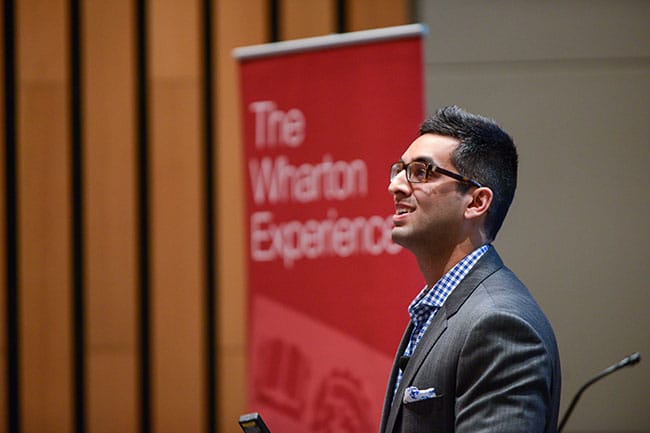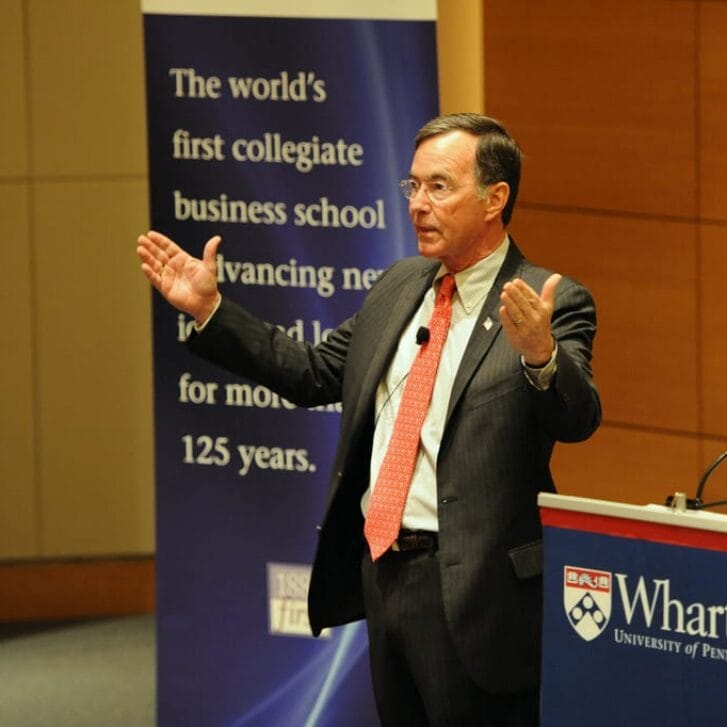Underdogs have won throughout history. David smacked down Goliath. Harry Truman gloated over the newspaper headline proclaiming Dewey’s presidential victory in 1948. A team of American amateurs humbled the professional hockey players of Russia in the 1980 Olympics. Rocky KO’ed Apollo Creed (after two tries). Wharton Management Professor Samir Nurmohamed has conducted research to understand why underdogs prevail, which he shared last week at the Wharton Leadership Conference.
“Is there something that happens when you’re an underdog?” he asked.
In other words, how is it that individuals and teams can thrive despite low expectations?

Prof. Samir Nurmohamed speaks at the 2015 Wharton Leadership Conference.
Nurmohamed did not limit his Wharton leadership research to biblical characters and real and fictional sports stars. He transposed it into the workplace. How can leaders and organizations motivate employees to succeed when others aren’t expecting them to?
When an underdog narrative is used to motivate individuals, it’s powerful stuff. It could lead to highly motivated individuals who come up with innovative strategies to gain results (versus “fat and happy” employees who just follow tired processes to maintain the status quo). Underdog employees may tend to be more creative in their problem-solving and more committed in their efforts.
His research is based on the existing academic literature on the underdog phenomenon, numerous interviews with underdog employees and their business leaders, as well as actual organizational experiments—such as the time he partnered with an executive to help motivate a team of retirement investment product brokers.
Here’s a quote from one of the interviewed underdogs, a 30-year-old male in the computer information sector:
“My boss set a very difficult deadline for a programming project and specifically for the portion I was delegated to write. Our boss himself didn’t truly expect me to meet the deadline. … It definitely required effort but a few inspirational moments helped create great leaps in progress. I felt great, powerful and on top of the world.”
Of course, not every manager can ply their employees with an underdog narrative to boost performance and morale—“Analysts don’t think we’ll be able to make our quarterly numbers since we lost our biggest client, but I still believe in you!”—and such narratives cannot replace a company’s overall culture. What’s more, according to Nurmohamed, certain conditions must be in place for the underdog narrative to work, such as authenticity, empowering leadership and perceived organizational support. Used incorrectly, this motivational force can even turn dark, with competition against a Goliath competitor or another department inspiring unethical behavior.
But playing the underdog could work in certain situations.
“You might want to think about how you’re framing the game,” Nurmohamed told the Wharton Leadership Conference audience that filled Dhirubhai Ambani Auditorium in Huntsman Hall.
Practice yourself by imaging you are in charge of employees not expected to succeed for one reason or another.
- First off, be realistic and envision how such a scenario could likely happen in your organization.
- What would you focus on to motivate them?
- How would you prevent their underdog status from eroding their performance?
- What would be the positive takeaways from the scenario even if you failed to boost team performance?
Bosses have on their side the observable truth that motivations for underdogs appear strong. It’s often the need to prove others (doubters) wrong, or prove oneself right—maintaining our positive perceptions of ourselves, while making sure others see us as we see ourselves. Even when we are no longer the underdog, we may want to continue to identify as one just for that motivational boost. For instance, see how Matthew McConaughey (an actor who hardly breaks a sweat to get new roles these days) explains still loving the underdog feeling:
Nurmohamed also can give a lesson or two about the history of the word “underdog.” It’s a term that appears to have originated from dog-fighting of yesteryear when the losing mutt would roll over on its back and submit—being literally underneath the winner. The term took on positive connotations—the newcomer or otherwise unimpressive contestant whom everyone wants to root for—after these verses by 19th century Maine poet David Barker:
The Under Dog
I know that the world that the great big world
From the peasant up to the king,
Has a different tale from the tale I tell,
And a different song to sing.
But for me, and I care not a single fig
If they say I am wrong or I am right,
I shall always go in for the weaker dog
For the under dog in the fight.
I know that the world that the great big world
Will never a moment stop
To see which dog may be in the right,
But will shout for the dog on top.
But for me I never shall pause to ask
Which dog may be in the right
For my heart will beat, while it beats at all,
For the under dog in the fight.
Perchance what I’ve said were better not said,
Or ’twere better I had said it “incog,”
But with heart and with glass filled chock to the brim,
Here is luck to the bottom dog.
Editor’s note: Visit the 2015 Wharton Leadership Conference website for additional information about the event itself.


























